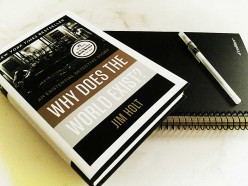Philosophers, I need your help!
- KFushaposted 10 years ago
0

Last night, I came across a paragraph in the very first page of a book titled "Why Does The World Exist?" by Jim Holt, which puzzled me for hours.
I wrote a Hub about it, which you can find here: http://kfusha.hubpages.com/hub/If-There … -Forbidden
But now I am interested in hearing your perspective, your interpretation of these sentences. The paragraph reads as follows:
"Suppose there were nothing. Then there would be no laws; for laws, after all, are something. If there were no laws, then everything would be permitted. If everything were permitted, then nothing would be forbidden. So if there were nothing, nothing would be forbidden. Thus nothing is self-forbidding. Therefore, there must be something. QED."
In your opinion, is this statement plausible? If yes, why? If no, why not?A nifty puzzle. Seems to me that although the logic is correct, the meaning of the term "nothing" is changing through the paragraph. When the original meaning is used, coupled with the changed meaning that is assumed to be identical with the first, it causes conflict.
You are absolutely right. I also made the same observation. In my opinion, the term "nothing" initially refers to a human society functioning in the absence of laws and governing authority and then transforms into "the existence of nothingness".
Just so. Sometimes it's "the absence of anything" and sometimes it's "none of what is there". Hard to describe.
It is absolutely fascinating how the combination of a few words can have such a huge, almost uncompromisable meaning.
Wrong language. Us the language of mathematics and it is nearly impossible to produce such a statement. English is not well suited for exacting, precise or logical discussion.
Yes, I totally agree with that statement.
I read a book a few weeks ago in which the author had dedicated a whole chapter to Latin. I was amazed at how a language which is considered "ancient" was so much more profound and precise than modern-day English. The translation of a phrase which was easily understood in two simple Latin words, would require at least 10-15 English words in order to preserve the exact meaning.
It merely and involved way of saying.
Since nothing is bound to negate itself, it is the cause of everything..
thus something comes from nothing.
Here is a common conversation...
Me: You are Life
Other: No I am not.
Me: If you are not Life then you are death.
Other: No I am not..
Now since Other will not accept that he is Life
neither that he is death... Then what is He?
Will Other realise that if he accept that he is Life...then Life he is..or
If he is death, then Life He Is.
His error is that he remains in the stagnant place, which causes him to be self destructing (Death)That is very profound and insightful, and I thank you for sharing it. However, I was referring to the specific, above-displayed paragraph and whether it is a plausible statement, or not.
I merely simplified it....
there are very many ways to say the same thing.You are absolutely right, there are an infinite amount of ways to say the same thing, but mine was a yes or no question, referring specifically to the author's passage. I am having trouble relating what you said to the paragraph I displayed and the question I asked.
p.s. I personally wouldn't call that simplifying, but thank you for answering, regardless.Deleted
Under your post, clicking the "more" button will bring up an "edit" button, at least for a while. Eventually the option is removed.
If I said yes , or even no...
would you have understood.
I am sure you would be asking for more contextWell, if you would have paid close attention to the forum post before you decided to reply to it, you would have noticed that my question clearly states, "In your opinion, is this statement plausible? If yes, why? If no, why not?".
So you are saying my explanation does not relay to you my position to your initial question?
if that where you want to be, then i shall leave you be..No, it does not. This is not a theological post. It is one that poses a question from a philosophical or linguistic perspective. Let's just agree to disagree. Have a great day.
Why do you feel the need to criticize something that you don't even understand?
"Let's agree to disagree." is a common saying in American English when two people are not able to find common ground on a specific issue, a discussion or whatever it may be.So let me see
I am unable simplify my answer to a yes or no....despite writing a paragraph
I am unable to find the line between theology and philosophy,( if there be one)
I Lack understanding.....( you can fill the blank to make it specific, otherwise it remains general)
I have a zeal for criticism...
I need schooling to understand the term "agree to disagree"......
therefore I must be a retard if i am that bad.
lolI have been trying to end this pointless discussion between us since the very beginning.
You obviously have a general habit of taking what others say and twisting it in your own favor, or maybe it might be that you simply lack intensive knowledge of the English language. (I suggest you revise what you write before you submit it, because the majority of your sentences make absolutely no sense.)
You have replied with an ignorant, defensive and self-righteous tone to every single thing I have said. I am absolutely positive that, as you are reading this, you are thinking of a good rebuttal, instead of truly attempting to understand the meaning behind my words.
Retarded? No, I wouldn't use that term.
Ignorant, self-righteous and close-minded? Yes, that sounds like a far more suitable description.
Take two Wittgensteins and call me when you see the fallacy.
Basically it is a word game, not a real argument. You can't turn nothing into something by saying nothing cannot destroy/forbid itself and therefore must exist. That's just nonsense. Nothing has nothing to destroy/forbid.
Related Discussions
- 28
How does one define self?
by mischeviousme 12 years ago
I have a basic idea as to what I am, a human being with all of the working parts. But what is this "I", which resides within? Am I my name, my job or my title? I know that everything I see is an electrochemical response to light entering my eyes and that every feeling likewise. But who is...
- 37
Which is the truer statement? Everything is beautiful in its own way or...
by savvydating 7 years ago
Which is the truer statement? Everything is beautiful in its own way or...Everything is Not beautiful in its own way? Which statement is in accordance with reality, in your personal opinion? Why so?
- 24
Did Trump learn nothing from the pipe bomb incident?
by J Conn 5 years ago
With today's reckless twitter post accusing his political adversaries of treason, does Trump not understand that he is putting the lives of American citizens at risk? It's long past time for an impeachment.
- 83
The he-said she-said immigration reform problem.
by ga anderson 9 years ago
I bet the authors of these two quotes will be quickly identified, but the real question is... what is so wrong with what they say?"America's immigration system is outdated, unsuited to the needs of our economy and to the values of our country. We should not be content with laws that punish...
- 19
If you were given a chance to live another life, would you chose to live your pr
by Justin Choo 6 years ago
If you were given a chance to live another life, would you chose to live your present life again?
- 5
All is well in Love and War?
by Aqeel Saeed 11 years ago
All is well in Love and War?This proverb often encourages people to use all means to avail, achieve and gain their intentions, goals or to find success in love or success in war. The question is that why we are indulged in such practice?To gain your goals is not objectionable. Everybody has a...









